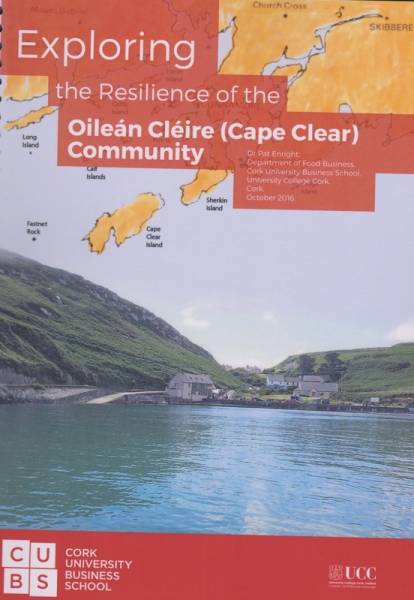|
Important new study on Cape Clear Island
Yesterday an important new study on Cape Clear Island came to hand. Titled Exploring the Resilience of the Oileán Chléire ( Cape Clear) Community it was published by Cork University Business School. It is based on a series of in-depth interviews carried out in 2015 with Island residents, many of whom will no doubt remember it well. As it states this is a study of the resilience of the community, carried out according to a tried and tested methodology. The concept originated in the study of ecology and was later adapted for social/economic use.
With a sample of 68% of the adult population, this is probably the most comprehensive indicator of the human and social capital on the Island. It should not come as a surprise that there are marked difference between the Island community and the wider local community. Some of these, however may be unexpected. These include lowered levels of debt on the Island and a higher level of third level education that is the norm. Other news is not so good, the average age of the respondents was 54, there are concerns about sustainable tourism, broadband, nursing cover, the road and public water networks and issues with secondary education. Apart from this infrastructure is generally perceived to be good with ferry access curtailed by being weather dependant.
However on the most important factor of all, general contentment and happiness, the results were very positive indeed. Based on the Oxford Happiness Survey it seems that 26% are very happy and 53% pretty happy and optimistic, which means that almost 80% of us have a very positive outlook.
In many ways the study, reiterates in a more scientific and formal format, something which we have known for some time, we remain a fantastic community on Cape Clear but we have some challenges ahead of us to keep our community alive. In that regard a positive frame of mind may be the most important asset we have.
Islanders will no doubt wish to examine the study for themselves and copies will be made available to the library.
We thank Dr Pat Enright of the Department of Food Business, UCC who initiated and directed this study.
|